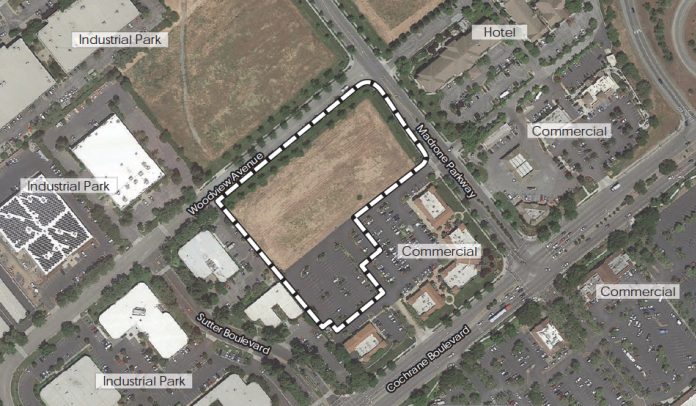Morgan Hill hotel owners are fighting the City Council’s decision to approve the zoning amendment that will allow two hotels to be built in Madrone Village.
The council first approved a zoning amendment for the properties at a Jan. 23 council meeting with a 5-0 vote. After the second reading of the ordinance on Feb. 6, a petition to challenge the council’s decision to allow two four-story hotels—a Marriott and a Hilton—to be built in the business park began to gain signatures.
Madrone Village is the shopping center/business park off of Cochrane Road and Madrone Parkway. It had originally been zoned for a larger commercial space, such as a grocery store.
An email sent the night of Feb.11 by Maureen Tobin, communication and engagement manager for the City of Morgan Hill, said the petition urged council members to reverse their unanimous decision or the petitioners “will force an election on the matter no sooner than 88 days from certification of the signatures, but most likely Fall 2019.”
Council members see the new hotels as a source of revenue for the city.
However, local hotel owners have been voicing concern over the zoning amendment since it came before the Planning Commission in December. Several letters were presented by hotel owners to the commission and the council, warning that the addition of hotels would cause a saturation of rooms and drive down business for existing establishments.
Asit Panwala, whose parents own the Comfort Inn in Morgan Hill, has been leading the fight against the two new hotels. He said Tobin’s email was an abuse of power by the city and that the facts she presented about a referendum did not represent a full picture.
“It was improper for the city to use a city email list and resource list to essentially campaign against the petition,” Panwala told the Times. “It was clearly bias in favor of the developer.”
Panwala believed the email violated California Government Code 54964, which prohibits an employee of a public agency from expending public resources on efforts to oppose or promote a ballot measure.
But City Attorney Don Larkin said Tobin’s email was not in violation of the state code because the law allows a city government to provide information on a proposed ballot measure and its impacts.
“Were not allowed to advocate yes or no, but we are allowed to say what the impact would be,” said Larkin.
He told the Times the email was an attempt to clarify the situation to the public. Larkin said the move came after residents reached out to the city. “We were getting questions from people which showed the information out there was beyond inaccurate; it was completely false,” said Larkin.
Tobin’s Feb. 11 email does not specify when and where the petitioners presented inaccurate information. The petition itself—which has been circulated in recent days by paid signature gatherers in front of local shopping centers—states that those who sign it are seeking the repeal of the Madrone Village rezoning amendment approved by the council Feb. 6. Attached to the petition is a copy of the city’s ordinance.
Panwala said the hoteliers worked with attorney Randy Toch to raft the petition. The paperwork does not contain any editorialized information for or against the rezoning or proposed hotels. Panwala said the documents follow the designated format for the type of petition.
Brad Krouskup, president and CEO of Toeniskoetter Development, Inc, which owns the land in the business park, spoke to the council Jan. 23 and wrote a letter stating it had been increasingly difficult for him to find and keep commercial retailers in his storefronts.
The Feb. 11 email indicated that the city feared that if the petition was successful, it would prevent Morgan Hill from collecting hotel tax revenues from the two proposed lodging facilities after the projects are completed at an undetermined future date.
“The petition drive is being funded by representatives of other hotels in Morgan Hill and, if successful, would cause the city to lose approximately $800,000 annually in projected general fund revenues from transient occupancy taxes (TOT), which provide funding for police, fire, parks and road maintenance,” wrote Tobin. “A special election, if necessary, would also impact the city’s general fund at a cost from $200,000 (to) $400,000.”
The council’s approval of the two hotels comes as the city continues to push for more tourism. Voters in the November election approved a 1 percent increase to the city’s transient occupancy tax to 11 percent, which was originally estimated to bring an additional $270,000 in revenue to Morgan Hill each year.
With the TOT increase came approval by the council for the formation of a tourism business inclusion district.
Panwala said the city’s claim that the loss of the two hotels would result in a loss of TOT dollars is not necessarily correct. He told the Times that if the same number of guests are spread out among existing hotels then the TOT would stay the same.
For a referendum to block the council’s decision, the petition must get valid 2,390 signatures, or 10 percent of Morgan Hill’s registered voting population, and be submitted by March 8. From that date the Santa Clara County Registrar of Voters would have 30 days to certify the results of the referendum.
If the results of the referendum are certified, the council can decide to repeal the ordinance or put it to the residents of Morgan Hill for a vote. Tobin said in her press release that if the council moves forward with a vote, the election would have to take place 88 days later, likely in November 2019, or be held until the general election in November 2020.








